Literature Review Report: Corporate Social Responsibility Analysis
VerifiedAdded on 2021/01/02
|9
|2656
|82
Report
AI Summary
This individual report presents a literature review on Corporate Social Responsibility (CSR). The report begins with an introduction defining literature reviews and their purpose, emphasizing their role in providing a comprehensive understanding of a research topic through scholarly articles and publications. The main body of the report then delves into the concept of CSR, exploring its definition, types, and benefits, and highlights the importance of CSR initiatives for building a strong brand image, protecting stakeholder interests, and promoting sustainable development. The review discusses the four types of social responsibilities (ethical, economical, legal, and philanthropic) and the positive impacts of CSR on brand recognition, customer loyalty, and financial performance. The report also examines the benefits of CSR, such as easy access to capital, cost savings, and attracting talent. Finally, it concludes that CSR is essential for organizations to operate ethically, sustainably, and responsibly, ensuring long-term success and positive public image. The report also provides an overview of the various CSR initiatives that companies can undertake, such as reducing carbon emissions, providing free education, and donating to charity.

INDIVIDUAL REPORT
Paraphrase This Document
Need a fresh take? Get an instant paraphrase of this document with our AI Paraphraser
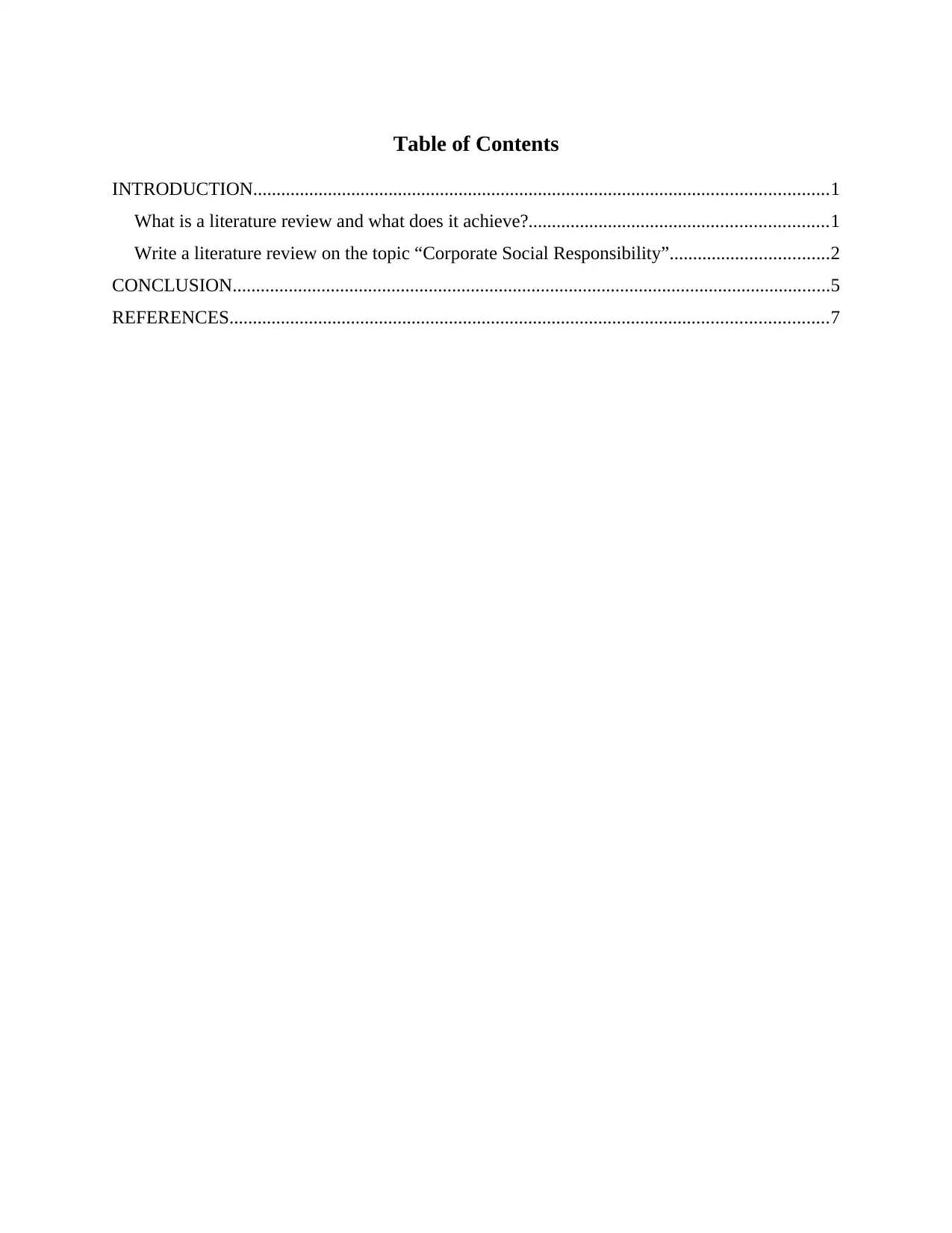
Table of Contents
INTRODUCTION...........................................................................................................................1
What is a literature review and what does it achieve?................................................................1
Write a literature review on the topic “Corporate Social Responsibility”..................................2
CONCLUSION................................................................................................................................5
REFERENCES................................................................................................................................7
INTRODUCTION...........................................................................................................................1
What is a literature review and what does it achieve?................................................................1
Write a literature review on the topic “Corporate Social Responsibility”..................................2
CONCLUSION................................................................................................................................5
REFERENCES................................................................................................................................7
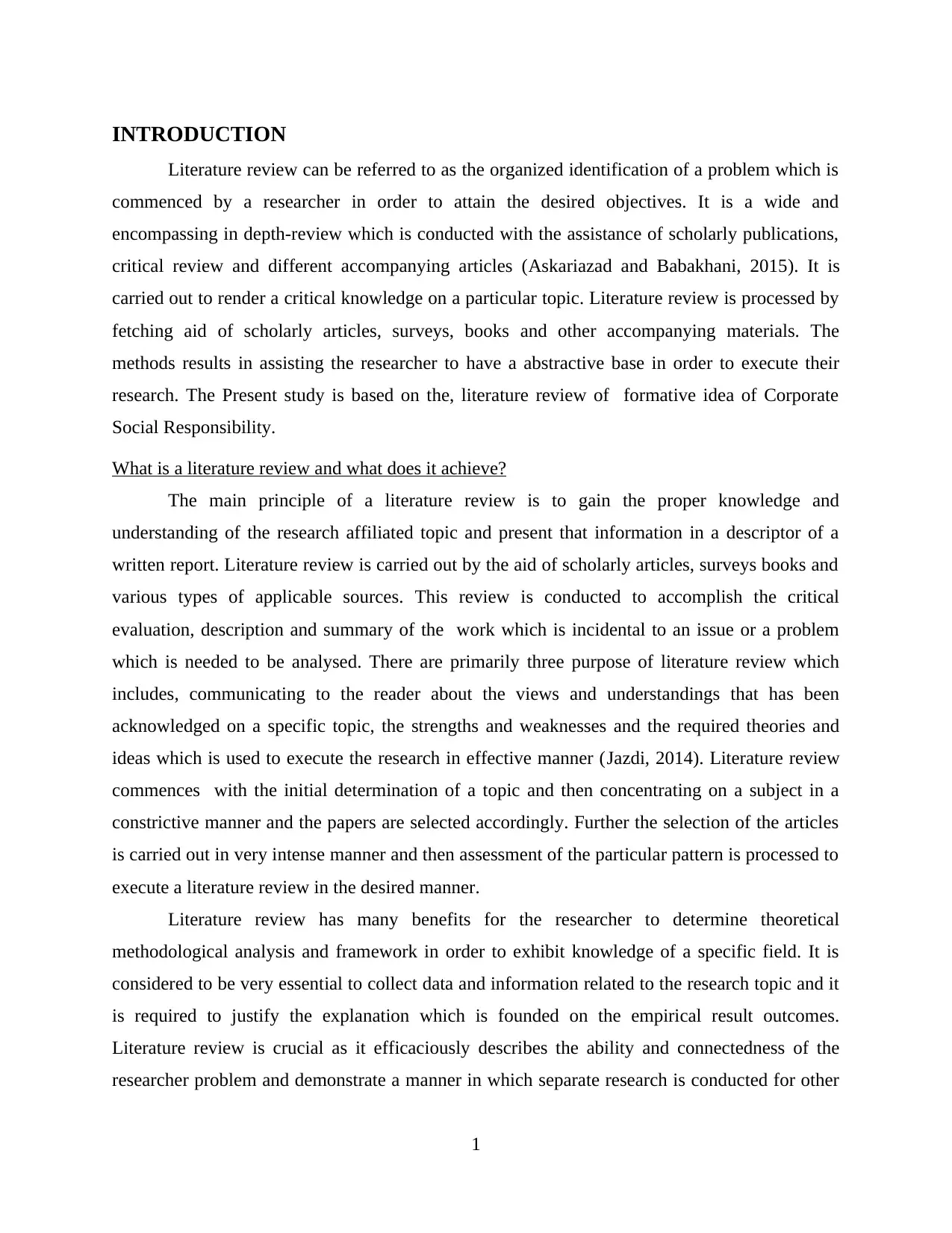
INTRODUCTION
Literature review can be referred to as the organized identification of a problem which is
commenced by a researcher in order to attain the desired objectives. It is a wide and
encompassing in depth-review which is conducted with the assistance of scholarly publications,
critical review and different accompanying articles (Askariazad and Babakhani, 2015). It is
carried out to render a critical knowledge on a particular topic. Literature review is processed by
fetching aid of scholarly articles, surveys, books and other accompanying materials. The
methods results in assisting the researcher to have a abstractive base in order to execute their
research. The Present study is based on the, literature review of formative idea of Corporate
Social Responsibility.
What is a literature review and what does it achieve?
The main principle of a literature review is to gain the proper knowledge and
understanding of the research affiliated topic and present that information in a descriptor of a
written report. Literature review is carried out by the aid of scholarly articles, surveys books and
various types of applicable sources. This review is conducted to accomplish the critical
evaluation, description and summary of the work which is incidental to an issue or a problem
which is needed to be analysed. There are primarily three purpose of literature review which
includes, communicating to the reader about the views and understandings that has been
acknowledged on a specific topic, the strengths and weaknesses and the required theories and
ideas which is used to execute the research in effective manner (Jazdi, 2014). Literature review
commences with the initial determination of a topic and then concentrating on a subject in a
constrictive manner and the papers are selected accordingly. Further the selection of the articles
is carried out in very intense manner and then assessment of the particular pattern is processed to
execute a literature review in the desired manner.
Literature review has many benefits for the researcher to determine theoretical
methodological analysis and framework in order to exhibit knowledge of a specific field. It is
considered to be very essential to collect data and information related to the research topic and it
is required to justify the explanation which is founded on the empirical result outcomes.
Literature review is crucial as it efficaciously describes the ability and connectedness of the
researcher problem and demonstrate a manner in which separate research is conducted for other
1
Literature review can be referred to as the organized identification of a problem which is
commenced by a researcher in order to attain the desired objectives. It is a wide and
encompassing in depth-review which is conducted with the assistance of scholarly publications,
critical review and different accompanying articles (Askariazad and Babakhani, 2015). It is
carried out to render a critical knowledge on a particular topic. Literature review is processed by
fetching aid of scholarly articles, surveys, books and other accompanying materials. The
methods results in assisting the researcher to have a abstractive base in order to execute their
research. The Present study is based on the, literature review of formative idea of Corporate
Social Responsibility.
What is a literature review and what does it achieve?
The main principle of a literature review is to gain the proper knowledge and
understanding of the research affiliated topic and present that information in a descriptor of a
written report. Literature review is carried out by the aid of scholarly articles, surveys books and
various types of applicable sources. This review is conducted to accomplish the critical
evaluation, description and summary of the work which is incidental to an issue or a problem
which is needed to be analysed. There are primarily three purpose of literature review which
includes, communicating to the reader about the views and understandings that has been
acknowledged on a specific topic, the strengths and weaknesses and the required theories and
ideas which is used to execute the research in effective manner (Jazdi, 2014). Literature review
commences with the initial determination of a topic and then concentrating on a subject in a
constrictive manner and the papers are selected accordingly. Further the selection of the articles
is carried out in very intense manner and then assessment of the particular pattern is processed to
execute a literature review in the desired manner.
Literature review has many benefits for the researcher to determine theoretical
methodological analysis and framework in order to exhibit knowledge of a specific field. It is
considered to be very essential to collect data and information related to the research topic and it
is required to justify the explanation which is founded on the empirical result outcomes.
Literature review is crucial as it efficaciously describes the ability and connectedness of the
researcher problem and demonstrate a manner in which separate research is conducted for other
1
⊘ This is a preview!⊘
Do you want full access?
Subscribe today to unlock all pages.

Trusted by 1+ million students worldwide
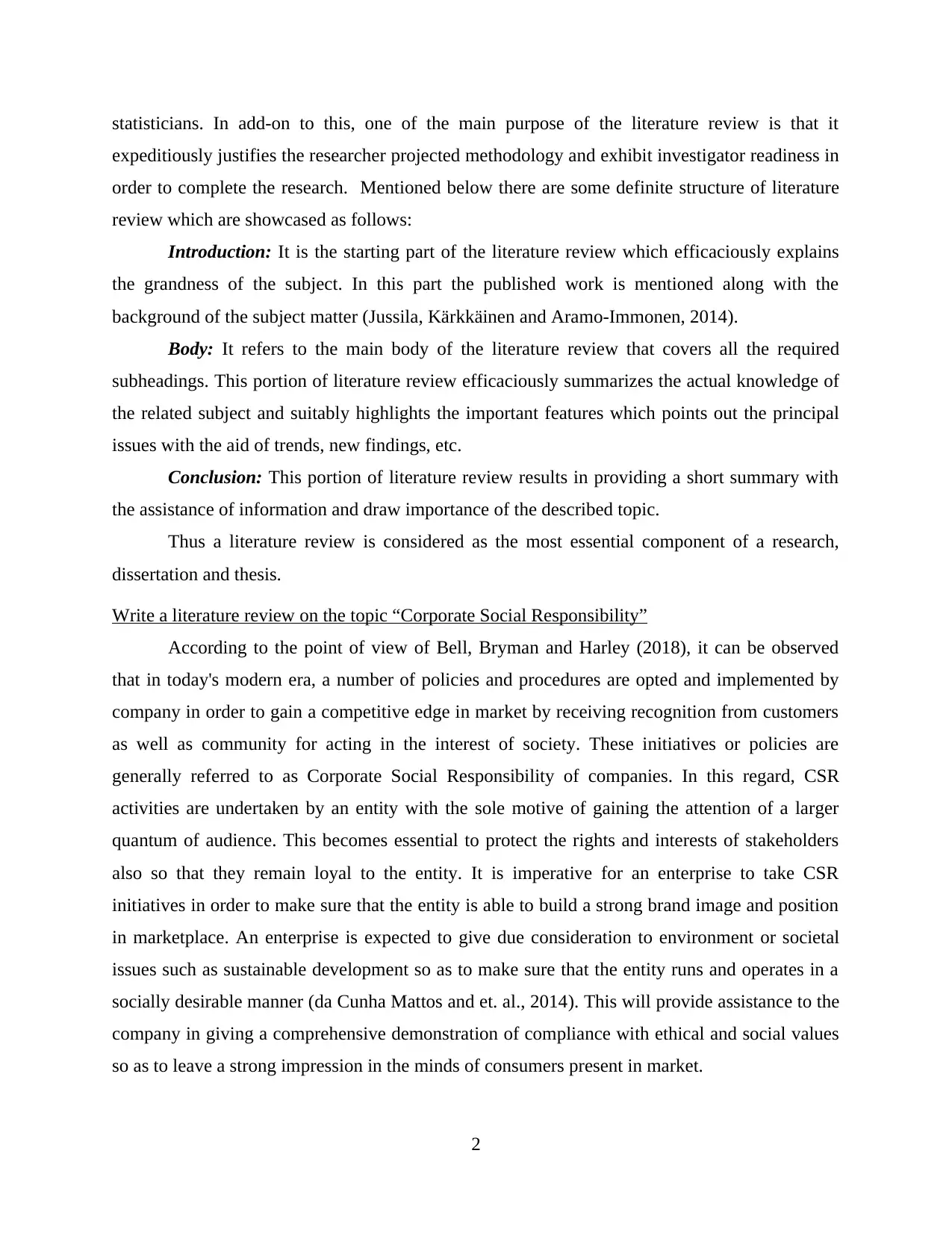
statisticians. In add-on to this, one of the main purpose of the literature review is that it
expeditiously justifies the researcher projected methodology and exhibit investigator readiness in
order to complete the research. Mentioned below there are some definite structure of literature
review which are showcased as follows:
Introduction: It is the starting part of the literature review which efficaciously explains
the grandness of the subject. In this part the published work is mentioned along with the
background of the subject matter (Jussila, Kärkkäinen and Aramo-Immonen, 2014).
Body: It refers to the main body of the literature review that covers all the required
subheadings. This portion of literature review efficaciously summarizes the actual knowledge of
the related subject and suitably highlights the important features which points out the principal
issues with the aid of trends, new findings, etc.
Conclusion: This portion of literature review results in providing a short summary with
the assistance of information and draw importance of the described topic.
Thus a literature review is considered as the most essential component of a research,
dissertation and thesis.
Write a literature review on the topic “Corporate Social Responsibility”
According to the point of view of Bell, Bryman and Harley (2018), it can be observed
that in today's modern era, a number of policies and procedures are opted and implemented by
company in order to gain a competitive edge in market by receiving recognition from customers
as well as community for acting in the interest of society. These initiatives or policies are
generally referred to as Corporate Social Responsibility of companies. In this regard, CSR
activities are undertaken by an entity with the sole motive of gaining the attention of a larger
quantum of audience. This becomes essential to protect the rights and interests of stakeholders
also so that they remain loyal to the entity. It is imperative for an enterprise to take CSR
initiatives in order to make sure that the entity is able to build a strong brand image and position
in marketplace. An enterprise is expected to give due consideration to environment or societal
issues such as sustainable development so as to make sure that the entity runs and operates in a
socially desirable manner (da Cunha Mattos and et. al., 2014). This will provide assistance to the
company in giving a comprehensive demonstration of compliance with ethical and social values
so as to leave a strong impression in the minds of consumers present in market.
2
expeditiously justifies the researcher projected methodology and exhibit investigator readiness in
order to complete the research. Mentioned below there are some definite structure of literature
review which are showcased as follows:
Introduction: It is the starting part of the literature review which efficaciously explains
the grandness of the subject. In this part the published work is mentioned along with the
background of the subject matter (Jussila, Kärkkäinen and Aramo-Immonen, 2014).
Body: It refers to the main body of the literature review that covers all the required
subheadings. This portion of literature review efficaciously summarizes the actual knowledge of
the related subject and suitably highlights the important features which points out the principal
issues with the aid of trends, new findings, etc.
Conclusion: This portion of literature review results in providing a short summary with
the assistance of information and draw importance of the described topic.
Thus a literature review is considered as the most essential component of a research,
dissertation and thesis.
Write a literature review on the topic “Corporate Social Responsibility”
According to the point of view of Bell, Bryman and Harley (2018), it can be observed
that in today's modern era, a number of policies and procedures are opted and implemented by
company in order to gain a competitive edge in market by receiving recognition from customers
as well as community for acting in the interest of society. These initiatives or policies are
generally referred to as Corporate Social Responsibility of companies. In this regard, CSR
activities are undertaken by an entity with the sole motive of gaining the attention of a larger
quantum of audience. This becomes essential to protect the rights and interests of stakeholders
also so that they remain loyal to the entity. It is imperative for an enterprise to take CSR
initiatives in order to make sure that the entity is able to build a strong brand image and position
in marketplace. An enterprise is expected to give due consideration to environment or societal
issues such as sustainable development so as to make sure that the entity runs and operates in a
socially desirable manner (da Cunha Mattos and et. al., 2014). This will provide assistance to the
company in giving a comprehensive demonstration of compliance with ethical and social values
so as to leave a strong impression in the minds of consumers present in market.
2
Paraphrase This Document
Need a fresh take? Get an instant paraphrase of this document with our AI Paraphraser
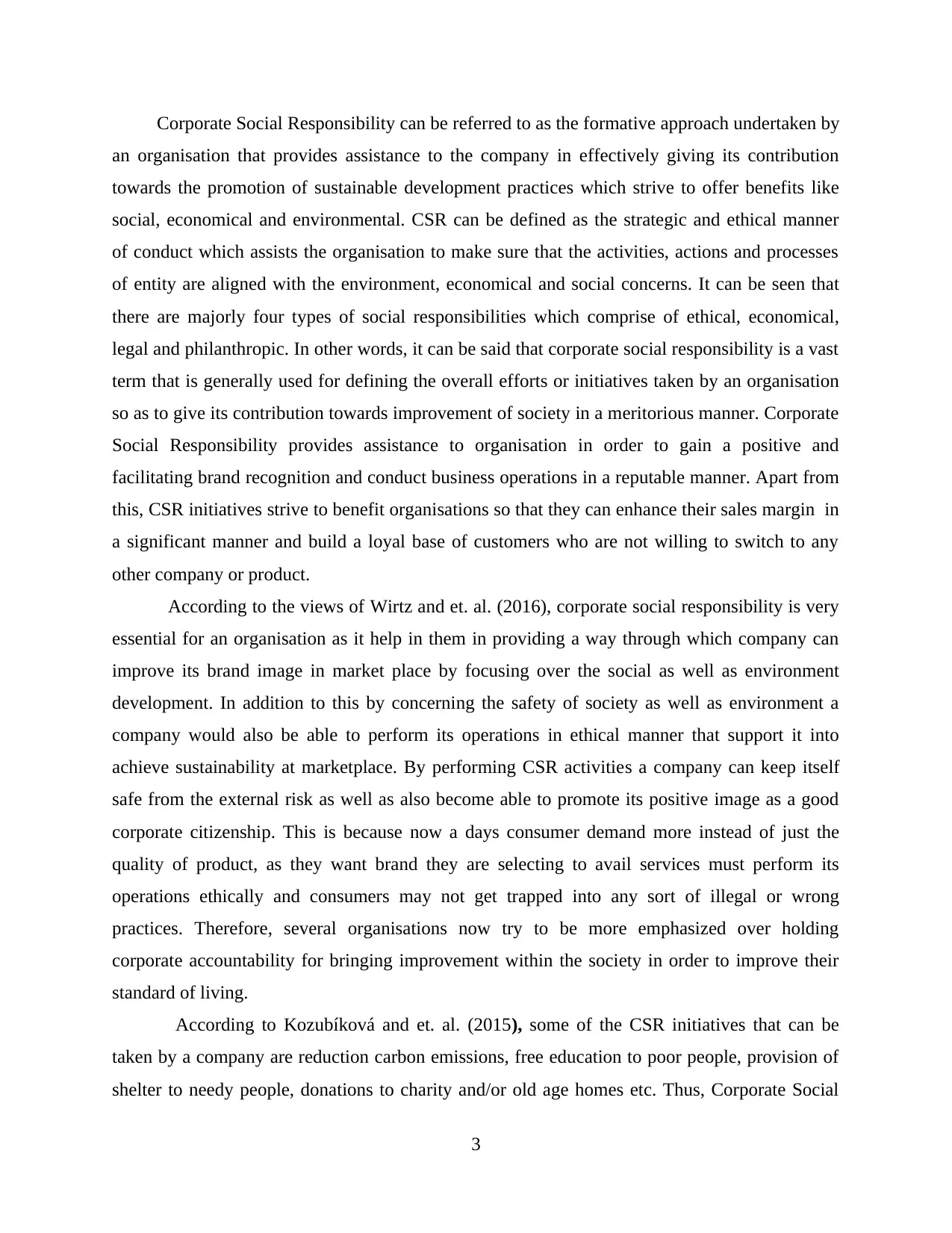
Corporate Social Responsibility can be referred to as the formative approach undertaken by
an organisation that provides assistance to the company in effectively giving its contribution
towards the promotion of sustainable development practices which strive to offer benefits like
social, economical and environmental. CSR can be defined as the strategic and ethical manner
of conduct which assists the organisation to make sure that the activities, actions and processes
of entity are aligned with the environment, economical and social concerns. It can be seen that
there are majorly four types of social responsibilities which comprise of ethical, economical,
legal and philanthropic. In other words, it can be said that corporate social responsibility is a vast
term that is generally used for defining the overall efforts or initiatives taken by an organisation
so as to give its contribution towards improvement of society in a meritorious manner. Corporate
Social Responsibility provides assistance to organisation in order to gain a positive and
facilitating brand recognition and conduct business operations in a reputable manner. Apart from
this, CSR initiatives strive to benefit organisations so that they can enhance their sales margin in
a significant manner and build a loyal base of customers who are not willing to switch to any
other company or product.
According to the views of Wirtz and et. al. (2016), corporate social responsibility is very
essential for an organisation as it help in them in providing a way through which company can
improve its brand image in market place by focusing over the social as well as environment
development. In addition to this by concerning the safety of society as well as environment a
company would also be able to perform its operations in ethical manner that support it into
achieve sustainability at marketplace. By performing CSR activities a company can keep itself
safe from the external risk as well as also become able to promote its positive image as a good
corporate citizenship. This is because now a days consumer demand more instead of just the
quality of product, as they want brand they are selecting to avail services must perform its
operations ethically and consumers may not get trapped into any sort of illegal or wrong
practices. Therefore, several organisations now try to be more emphasized over holding
corporate accountability for bringing improvement within the society in order to improve their
standard of living.
According to Kozubíková and et. al. (2015), some of the CSR initiatives that can be
taken by a company are reduction carbon emissions, free education to poor people, provision of
shelter to needy people, donations to charity and/or old age homes etc. Thus, Corporate Social
3
an organisation that provides assistance to the company in effectively giving its contribution
towards the promotion of sustainable development practices which strive to offer benefits like
social, economical and environmental. CSR can be defined as the strategic and ethical manner
of conduct which assists the organisation to make sure that the activities, actions and processes
of entity are aligned with the environment, economical and social concerns. It can be seen that
there are majorly four types of social responsibilities which comprise of ethical, economical,
legal and philanthropic. In other words, it can be said that corporate social responsibility is a vast
term that is generally used for defining the overall efforts or initiatives taken by an organisation
so as to give its contribution towards improvement of society in a meritorious manner. Corporate
Social Responsibility provides assistance to organisation in order to gain a positive and
facilitating brand recognition and conduct business operations in a reputable manner. Apart from
this, CSR initiatives strive to benefit organisations so that they can enhance their sales margin in
a significant manner and build a loyal base of customers who are not willing to switch to any
other company or product.
According to the views of Wirtz and et. al. (2016), corporate social responsibility is very
essential for an organisation as it help in them in providing a way through which company can
improve its brand image in market place by focusing over the social as well as environment
development. In addition to this by concerning the safety of society as well as environment a
company would also be able to perform its operations in ethical manner that support it into
achieve sustainability at marketplace. By performing CSR activities a company can keep itself
safe from the external risk as well as also become able to promote its positive image as a good
corporate citizenship. This is because now a days consumer demand more instead of just the
quality of product, as they want brand they are selecting to avail services must perform its
operations ethically and consumers may not get trapped into any sort of illegal or wrong
practices. Therefore, several organisations now try to be more emphasized over holding
corporate accountability for bringing improvement within the society in order to improve their
standard of living.
According to Kozubíková and et. al. (2015), some of the CSR initiatives that can be
taken by a company are reduction carbon emissions, free education to poor people, provision of
shelter to needy people, donations to charity and/or old age homes etc. Thus, Corporate Social
3
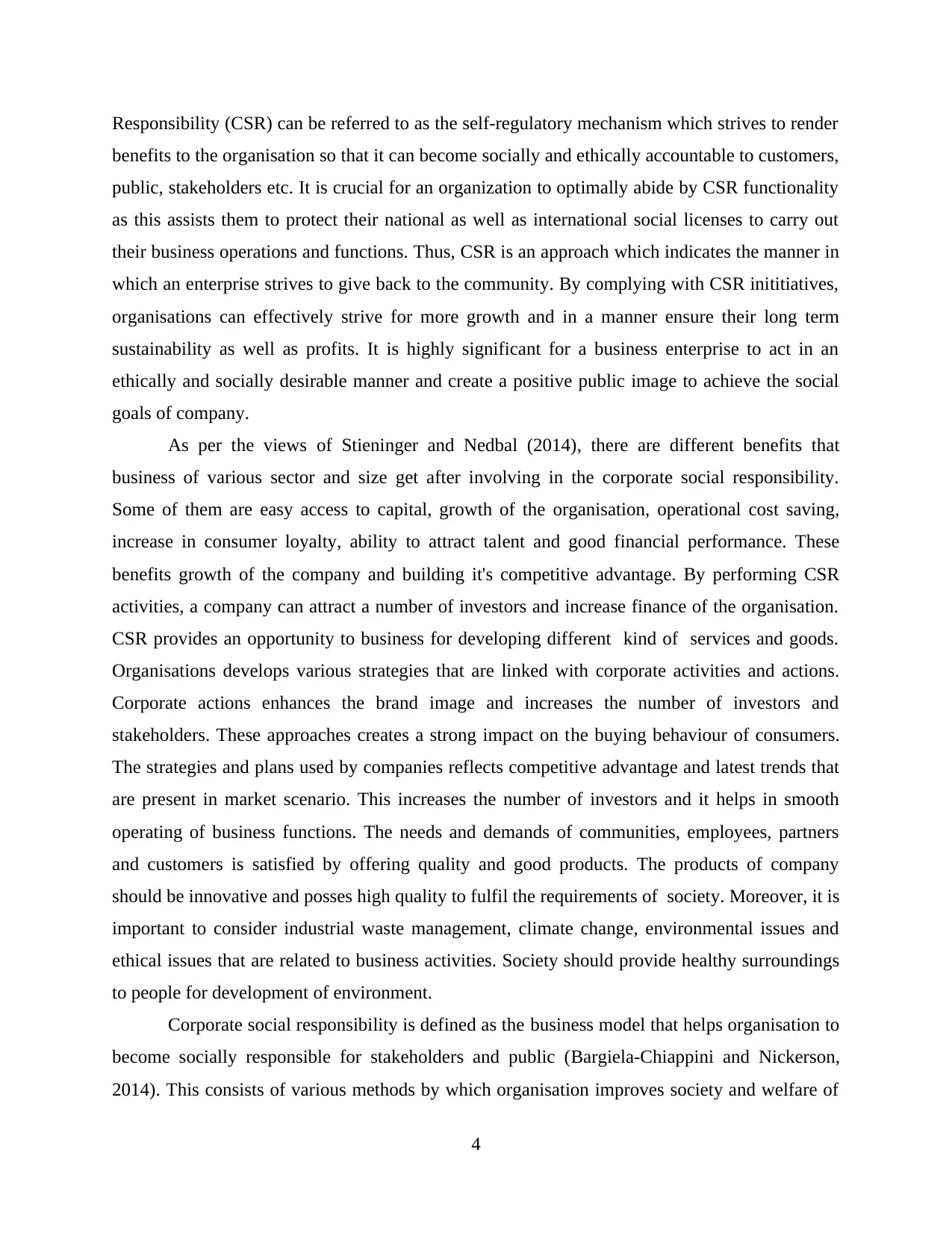
Responsibility (CSR) can be referred to as the self-regulatory mechanism which strives to render
benefits to the organisation so that it can become socially and ethically accountable to customers,
public, stakeholders etc. It is crucial for an organization to optimally abide by CSR functionality
as this assists them to protect their national as well as international social licenses to carry out
their business operations and functions. Thus, CSR is an approach which indicates the manner in
which an enterprise strives to give back to the community. By complying with CSR inititiatives,
organisations can effectively strive for more growth and in a manner ensure their long term
sustainability as well as profits. It is highly significant for a business enterprise to act in an
ethically and socially desirable manner and create a positive public image to achieve the social
goals of company.
As per the views of Stieninger and Nedbal (2014), there are different benefits that
business of various sector and size get after involving in the corporate social responsibility.
Some of them are easy access to capital, growth of the organisation, operational cost saving,
increase in consumer loyalty, ability to attract talent and good financial performance. These
benefits growth of the company and building it's competitive advantage. By performing CSR
activities, a company can attract a number of investors and increase finance of the organisation.
CSR provides an opportunity to business for developing different kind of services and goods.
Organisations develops various strategies that are linked with corporate activities and actions.
Corporate actions enhances the brand image and increases the number of investors and
stakeholders. These approaches creates a strong impact on the buying behaviour of consumers.
The strategies and plans used by companies reflects competitive advantage and latest trends that
are present in market scenario. This increases the number of investors and it helps in smooth
operating of business functions. The needs and demands of communities, employees, partners
and customers is satisfied by offering quality and good products. The products of company
should be innovative and posses high quality to fulfil the requirements of society. Moreover, it is
important to consider industrial waste management, climate change, environmental issues and
ethical issues that are related to business activities. Society should provide healthy surroundings
to people for development of environment.
Corporate social responsibility is defined as the business model that helps organisation to
become socially responsible for stakeholders and public (Bargiela-Chiappini and Nickerson,
2014). This consists of various methods by which organisation improves society and welfare of
4
benefits to the organisation so that it can become socially and ethically accountable to customers,
public, stakeholders etc. It is crucial for an organization to optimally abide by CSR functionality
as this assists them to protect their national as well as international social licenses to carry out
their business operations and functions. Thus, CSR is an approach which indicates the manner in
which an enterprise strives to give back to the community. By complying with CSR inititiatives,
organisations can effectively strive for more growth and in a manner ensure their long term
sustainability as well as profits. It is highly significant for a business enterprise to act in an
ethically and socially desirable manner and create a positive public image to achieve the social
goals of company.
As per the views of Stieninger and Nedbal (2014), there are different benefits that
business of various sector and size get after involving in the corporate social responsibility.
Some of them are easy access to capital, growth of the organisation, operational cost saving,
increase in consumer loyalty, ability to attract talent and good financial performance. These
benefits growth of the company and building it's competitive advantage. By performing CSR
activities, a company can attract a number of investors and increase finance of the organisation.
CSR provides an opportunity to business for developing different kind of services and goods.
Organisations develops various strategies that are linked with corporate activities and actions.
Corporate actions enhances the brand image and increases the number of investors and
stakeholders. These approaches creates a strong impact on the buying behaviour of consumers.
The strategies and plans used by companies reflects competitive advantage and latest trends that
are present in market scenario. This increases the number of investors and it helps in smooth
operating of business functions. The needs and demands of communities, employees, partners
and customers is satisfied by offering quality and good products. The products of company
should be innovative and posses high quality to fulfil the requirements of society. Moreover, it is
important to consider industrial waste management, climate change, environmental issues and
ethical issues that are related to business activities. Society should provide healthy surroundings
to people for development of environment.
Corporate social responsibility is defined as the business model that helps organisation to
become socially responsible for stakeholders and public (Bargiela-Chiappini and Nickerson,
2014). This consists of various methods by which organisation improves society and welfare of
4
⊘ This is a preview!⊘
Do you want full access?
Subscribe today to unlock all pages.

Trusted by 1+ million students worldwide
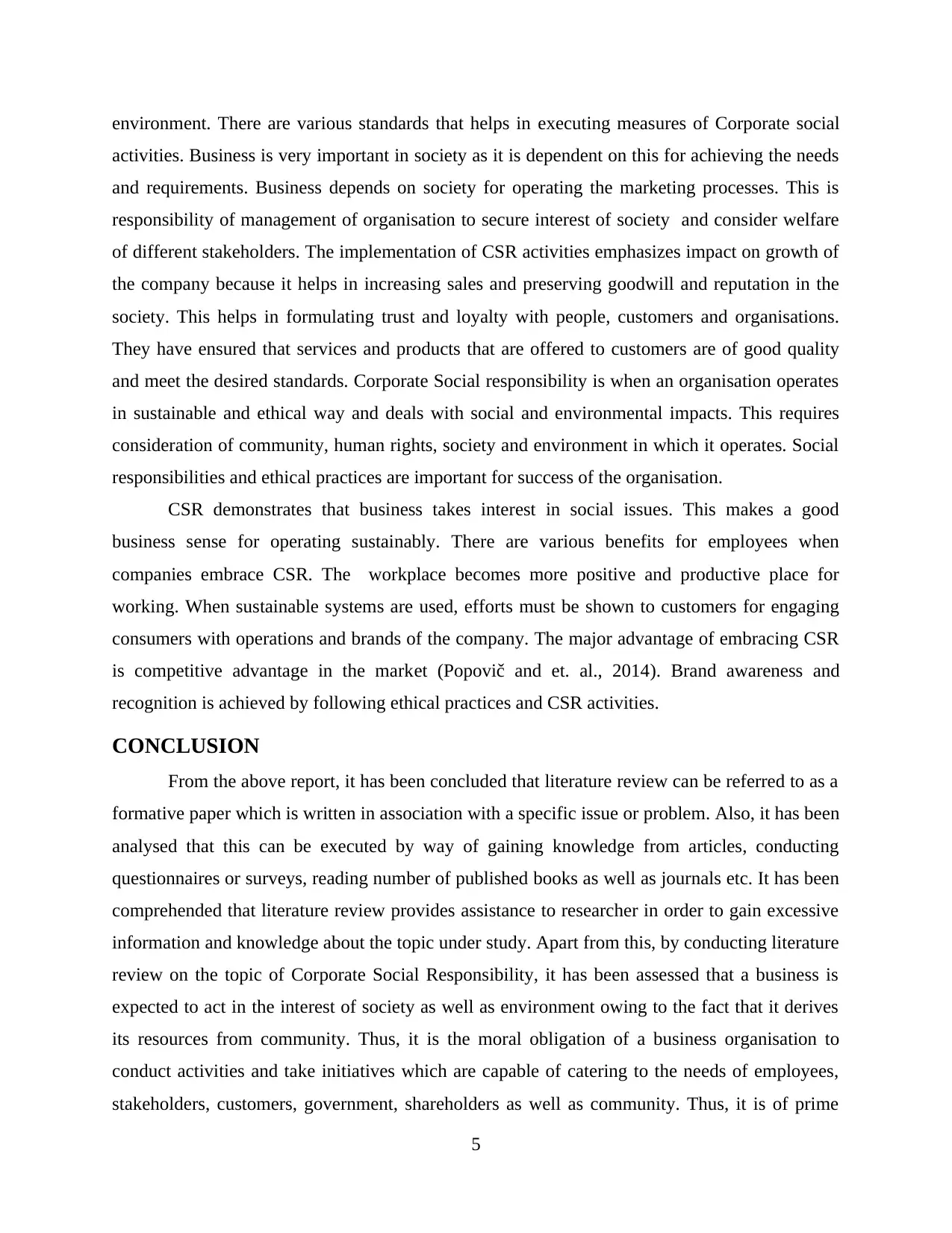
environment. There are various standards that helps in executing measures of Corporate social
activities. Business is very important in society as it is dependent on this for achieving the needs
and requirements. Business depends on society for operating the marketing processes. This is
responsibility of management of organisation to secure interest of society and consider welfare
of different stakeholders. The implementation of CSR activities emphasizes impact on growth of
the company because it helps in increasing sales and preserving goodwill and reputation in the
society. This helps in formulating trust and loyalty with people, customers and organisations.
They have ensured that services and products that are offered to customers are of good quality
and meet the desired standards. Corporate Social responsibility is when an organisation operates
in sustainable and ethical way and deals with social and environmental impacts. This requires
consideration of community, human rights, society and environment in which it operates. Social
responsibilities and ethical practices are important for success of the organisation.
CSR demonstrates that business takes interest in social issues. This makes a good
business sense for operating sustainably. There are various benefits for employees when
companies embrace CSR. The workplace becomes more positive and productive place for
working. When sustainable systems are used, efforts must be shown to customers for engaging
consumers with operations and brands of the company. The major advantage of embracing CSR
is competitive advantage in the market (Popovič and et. al., 2014). Brand awareness and
recognition is achieved by following ethical practices and CSR activities.
CONCLUSION
From the above report, it has been concluded that literature review can be referred to as a
formative paper which is written in association with a specific issue or problem. Also, it has been
analysed that this can be executed by way of gaining knowledge from articles, conducting
questionnaires or surveys, reading number of published books as well as journals etc. It has been
comprehended that literature review provides assistance to researcher in order to gain excessive
information and knowledge about the topic under study. Apart from this, by conducting literature
review on the topic of Corporate Social Responsibility, it has been assessed that a business is
expected to act in the interest of society as well as environment owing to the fact that it derives
its resources from community. Thus, it is the moral obligation of a business organisation to
conduct activities and take initiatives which are capable of catering to the needs of employees,
stakeholders, customers, government, shareholders as well as community. Thus, it is of prime
5
activities. Business is very important in society as it is dependent on this for achieving the needs
and requirements. Business depends on society for operating the marketing processes. This is
responsibility of management of organisation to secure interest of society and consider welfare
of different stakeholders. The implementation of CSR activities emphasizes impact on growth of
the company because it helps in increasing sales and preserving goodwill and reputation in the
society. This helps in formulating trust and loyalty with people, customers and organisations.
They have ensured that services and products that are offered to customers are of good quality
and meet the desired standards. Corporate Social responsibility is when an organisation operates
in sustainable and ethical way and deals with social and environmental impacts. This requires
consideration of community, human rights, society and environment in which it operates. Social
responsibilities and ethical practices are important for success of the organisation.
CSR demonstrates that business takes interest in social issues. This makes a good
business sense for operating sustainably. There are various benefits for employees when
companies embrace CSR. The workplace becomes more positive and productive place for
working. When sustainable systems are used, efforts must be shown to customers for engaging
consumers with operations and brands of the company. The major advantage of embracing CSR
is competitive advantage in the market (Popovič and et. al., 2014). Brand awareness and
recognition is achieved by following ethical practices and CSR activities.
CONCLUSION
From the above report, it has been concluded that literature review can be referred to as a
formative paper which is written in association with a specific issue or problem. Also, it has been
analysed that this can be executed by way of gaining knowledge from articles, conducting
questionnaires or surveys, reading number of published books as well as journals etc. It has been
comprehended that literature review provides assistance to researcher in order to gain excessive
information and knowledge about the topic under study. Apart from this, by conducting literature
review on the topic of Corporate Social Responsibility, it has been assessed that a business is
expected to act in the interest of society as well as environment owing to the fact that it derives
its resources from community. Thus, it is the moral obligation of a business organisation to
conduct activities and take initiatives which are capable of catering to the needs of employees,
stakeholders, customers, government, shareholders as well as community. Thus, it is of prime
5
Paraphrase This Document
Need a fresh take? Get an instant paraphrase of this document with our AI Paraphraser

significance that an organisation takes CSR initiatives so as to operate in a socially and legally
desirable manner.
6
desirable manner.
6
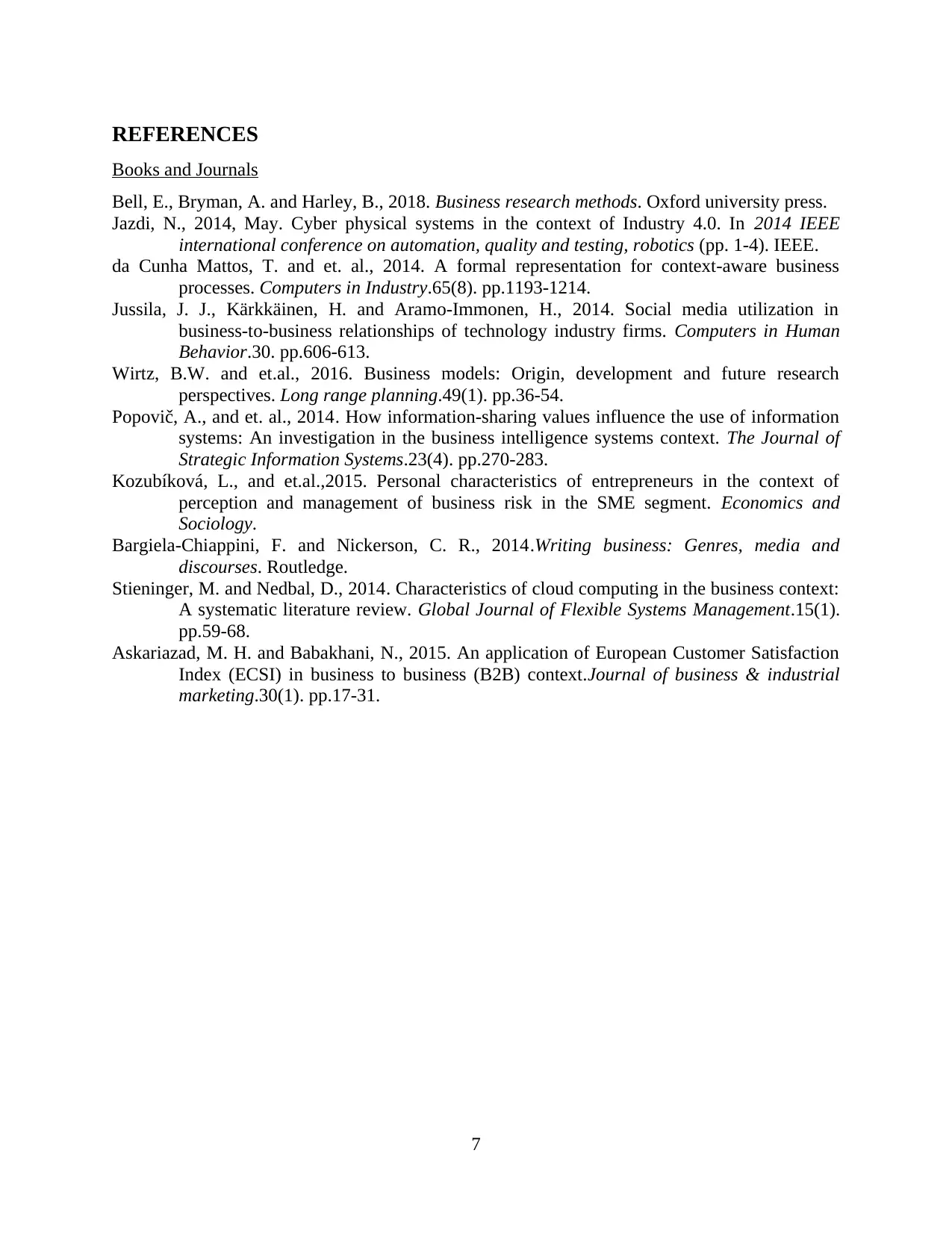
REFERENCES
Books and Journals
Bell, E., Bryman, A. and Harley, B., 2018. Business research methods. Oxford university press.
Jazdi, N., 2014, May. Cyber physical systems in the context of Industry 4.0. In 2014 IEEE
international conference on automation, quality and testing, robotics (pp. 1-4). IEEE.
da Cunha Mattos, T. and et. al., 2014. A formal representation for context-aware business
processes. Computers in Industry.65(8). pp.1193-1214.
Jussila, J. J., Kärkkäinen, H. and Aramo-Immonen, H., 2014. Social media utilization in
business-to-business relationships of technology industry firms. Computers in Human
Behavior.30. pp.606-613.
Wirtz, B.W. and et.al., 2016. Business models: Origin, development and future research
perspectives. Long range planning.49(1). pp.36-54.
Popovič, A., and et. al., 2014. How information-sharing values influence the use of information
systems: An investigation in the business intelligence systems context. The Journal of
Strategic Information Systems.23(4). pp.270-283.
Kozubíková, L., and et.al.,2015. Personal characteristics of entrepreneurs in the context of
perception and management of business risk in the SME segment. Economics and
Sociology.
Bargiela-Chiappini, F. and Nickerson, C. R., 2014.Writing business: Genres, media and
discourses. Routledge.
Stieninger, M. and Nedbal, D., 2014. Characteristics of cloud computing in the business context:
A systematic literature review. Global Journal of Flexible Systems Management.15(1).
pp.59-68.
Askariazad, M. H. and Babakhani, N., 2015. An application of European Customer Satisfaction
Index (ECSI) in business to business (B2B) context.Journal of business & industrial
marketing.30(1). pp.17-31.
7
Books and Journals
Bell, E., Bryman, A. and Harley, B., 2018. Business research methods. Oxford university press.
Jazdi, N., 2014, May. Cyber physical systems in the context of Industry 4.0. In 2014 IEEE
international conference on automation, quality and testing, robotics (pp. 1-4). IEEE.
da Cunha Mattos, T. and et. al., 2014. A formal representation for context-aware business
processes. Computers in Industry.65(8). pp.1193-1214.
Jussila, J. J., Kärkkäinen, H. and Aramo-Immonen, H., 2014. Social media utilization in
business-to-business relationships of technology industry firms. Computers in Human
Behavior.30. pp.606-613.
Wirtz, B.W. and et.al., 2016. Business models: Origin, development and future research
perspectives. Long range planning.49(1). pp.36-54.
Popovič, A., and et. al., 2014. How information-sharing values influence the use of information
systems: An investigation in the business intelligence systems context. The Journal of
Strategic Information Systems.23(4). pp.270-283.
Kozubíková, L., and et.al.,2015. Personal characteristics of entrepreneurs in the context of
perception and management of business risk in the SME segment. Economics and
Sociology.
Bargiela-Chiappini, F. and Nickerson, C. R., 2014.Writing business: Genres, media and
discourses. Routledge.
Stieninger, M. and Nedbal, D., 2014. Characteristics of cloud computing in the business context:
A systematic literature review. Global Journal of Flexible Systems Management.15(1).
pp.59-68.
Askariazad, M. H. and Babakhani, N., 2015. An application of European Customer Satisfaction
Index (ECSI) in business to business (B2B) context.Journal of business & industrial
marketing.30(1). pp.17-31.
7
⊘ This is a preview!⊘
Do you want full access?
Subscribe today to unlock all pages.

Trusted by 1+ million students worldwide
1 out of 9
Related Documents
Your All-in-One AI-Powered Toolkit for Academic Success.
+13062052269
info@desklib.com
Available 24*7 on WhatsApp / Email
![[object Object]](/_next/static/media/star-bottom.7253800d.svg)
Unlock your academic potential
Copyright © 2020–2025 A2Z Services. All Rights Reserved. Developed and managed by ZUCOL.





